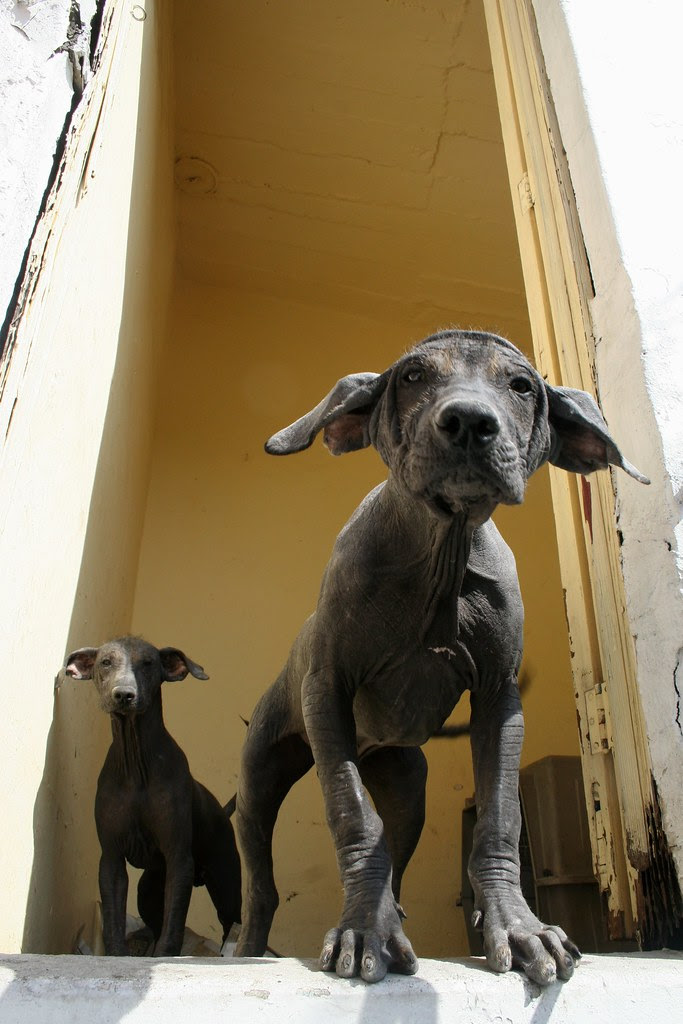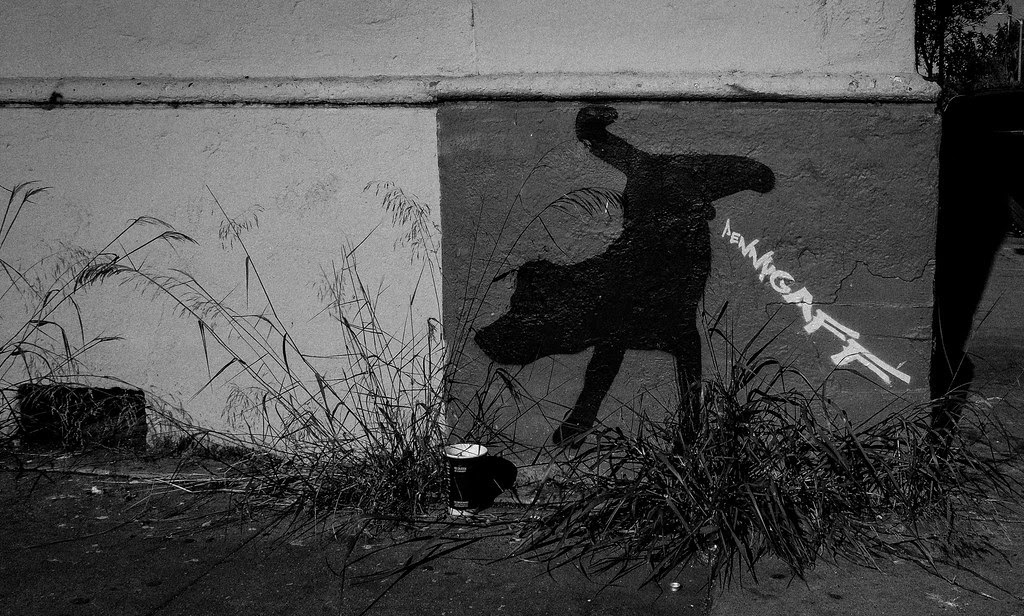
Black Dogs, Portland: photo by Austin Granger, 2 April 2014
He came from Malta; and Eumelus says
He had no better dog in all his days.
We called him Bull; he went into the dark.
Along those roads we cannot hear him bark.
He had no better dog in all his days.
We called him Bull; he went into the dark.
Along those roads we cannot hear him bark.
Tymnes: The Dog from Malta, of uncertain date, perhaps third century BC (?): from The Greek Anthology, translated by Edmund Blunden in Halfway House: A Miscellany of New Poems, 1932
On
17 June 1783, Samuel Johnson, long afflicted with poor circulation,
suffered a stroke. He wrote to a neighbor, James Allen, that he had lost
the power of speech. Two days later, after doctors had been brought in,
he was again able to speak. Still Johnson feared he was dying. In his
diary he wrote:
The black dog I hope always to resist, and in time to drive [off],
though I am deprived of almost all those that used to help me. The
neighbourhood is impoverished. I had once Richardson and Lawrence in my
reach. Mrs. Allen is dead. My house has lost Levet, a man who took
interest in everything, and therefore ready at conversation. Mrs.
Williams is so weak that she can be a companion no longer. When I rise
my breakfast is solitary, the black dog waits to share it, from
breakfast to dinner he continues barking, except that Dr. Brocklesby
for a little keeps him at a distance. Dinner with a sick woman you may
venture to suppose not much better than solitary. After dinner, what
remains but to count the clock, and hope for that sleep which I can
scarce expect. Night comes at last, and some hours of restlessness and
confusion bring me again to a day of solitude. What shall exclude the
black dog from an habitation like this?

Judy looks for UFOs in Stoneybatter: photo by Bruners, 23 September 2009
In his final years Johnson the diarist
was in the habit of recording in detail his
multiple physical and psychological symptoms, scrutinizing his state of
soul and body to a fine point, noting everything down, inscribing the
more
intimately personal entries in Latin. His troubled hours in the dark are
often the
subject of these entries. The scruples, spiritual misgivings and
self-questionings that had long haunted him now continually hovered over
his meditations. He toiled to keep his mind clear, and to trust in
Providence. Still... night must fall.

IMG_8807 (dogs, Xoloscuintle): photo by locaburg, 7 December 2005
The black dog was keeping an unwanted watch at his door.

DSCF8927 (Playa Trocones): photo by locaburg, 22 December 2013
He was vexed by gout and asthma, and too by dropsy (edema), chronic complaints for which he consumed squills, a diuretic herb then commonly employed to relieve the discomfort caused by fluid retention. He also self-medicated with diacodium, a syrup extracted from opium poppies. The opium became an increasingly necessary palliative. Still the release into sleep often eluded him. In the late summer of 1784 his distress was acute. On the night of 26 July he noted the presence of a "tristitia gravissima," or terrible sadness, weighing him down awfully.

IMG_8807 (dogs, Xoloscuintle): photo by locaburg, 7 December 2005
The black dog was keeping an unwanted watch at his door.

DSCF8927 (Playa Trocones): photo by locaburg, 22 December 2013
He was vexed by gout and asthma, and too by dropsy (edema), chronic complaints for which he consumed squills, a diuretic herb then commonly employed to relieve the discomfort caused by fluid retention. He also self-medicated with diacodium, a syrup extracted from opium poppies. The opium became an increasingly necessary palliative. Still the release into sleep often eluded him. In the late summer of 1784 his distress was acute. On the night of 26 July he noted the presence of a "tristitia gravissima," or terrible sadness, weighing him down awfully.

Samuel Johnson diary page, 26 July 1784 (facsimile): from the Donald and Mary Hyde Collection of Dr. Samuel Johnson, Houghton Library, Harvard
By the end of the year he was failing. There was now serious difficulty in breathing. He sat up in a chair through sleepless nights, deeply uneasy, labouring to get the thick air into his clogged lungs. Anxious friends insisted he hire a man to stay up with him. The man proved "sleepy as a dormouse"; while he dozed off, the restless Johnson watched; characteristically generous, he paid the useless man anyway.

Dog (Los Angeles): photo bymichaelj1998, 7 April 2014
His
last literary activity was a kind of therapeutic doodling: he passed
the trying nocturnal hours by translating poems from the Greek Anthology
into Latin verse; the schoolmaster in him had never been far from the
mischievous schoolboy. Was one of these the epigram of Tymnes?
He came from Malta; and Eumelus says
He had no better dog in all his days.
We called him Bull; he went into the dark.
Along those roads we cannot hear him bark.
His attempts to rise and move about by day, a stubborn bid to
retain something of himself -- "I will be conquered. I will not capitulate"
-- had come to an end by the beginning of December. He dictated a will
and insisted on having many private records and papers, including the
two quarto volumes containing his careful history of his own life, put
to the fire. On 12 December he ordered a surgeon to lance his legs to
drain fluid to relieve the dropsy which was now affecting his feet. When
the surgeon declined to cut deeply enough to satisfy him, Johnson
managed to get hold of scissors, and had a go himself, sustaining heavy
bleeding in the process.

snowhere: photo by Jordi Huisman, 5 May 2010
The next evening, as he drifted into delirium with the falling of the early London darkness, was the black dog
following him at a distance, coming close then hanging back, vigilant
and alert, always waiting now again outside his door for the solitary call?

Black dog, liquid metal (Ocean Grove, New Jersey): photo by nosha, 29 December 2013
Black strong and handsome - what a dog! #blackdog: image via frank ferreira @Bleu1995, 3 October 2014




4 comments:
Thanks, Tom. Beautiful piece on the great Dr. Johnson, though I'm not sure any of this is fair to black dogs.
Thanks galore to master TPW for remembering that Sam Johnson had a way with words -- picking the right ones, putting them in the right order -- such as few had before him, none after. No random shuffle program giggle will ever hold a candle to the mastery of language the brain showed itself capable of in this man, who once declared that after the age of twenty he seldom enjoyed a day of ease in his life.
Difficile est proprie communia dicere.
This post has elicited back channel defenses (I guess) of dogs, in particular black dogs. Hey, let's make it plain, neither I nor Saml Johnson had anything against black dogs.
The term is metaphorical.
In modern pop psychological parlance, the Black Dog is a symbolic creature, herald of bipolar disorders and clinical depression.
In traditional British folklore the nocturnal apparition of a large, silent, diabolical-seeming black dog, with great glowing eyes, was commonly regarded as a portent of death. The sites of electrical storms, lonely crossroads, scaffolds where public executions had taken place, ancient roads and pathways, and above all boggy moors and mires, were thought to be its preternaturally-designated haunts and precincts.
The luminous, ghastly and spectral black hound reported to be roaming the boggy mires of Dartmoor in Arthur Conan Doyle's fiction of Sherlock Holmes was a descendant of this ominous creature of folk legend.
"...there stood a foul thing, a great, black beast, shaped like a hound, yet larger than any hound that ever mortal eye has rested upon. And even as they looked the thing tore the throat out of Hugo Baskerville, on which, as it turned its blazing eyes and dripping jaws upon them, the three shrieked with fear and rode for dear life, still screaming, across the moor. One, it is said, died that very night of what he had seen, and the other twain were but broken men for the rest of their days."
One of the first films I can recall being scared half to death by, as a child, was The Hound of the Baskervilles. A black dog film. A great black dog with glowing eyes was prowling this mysterious place far from Chicago called the Moors, periodically uttering blood-curdling howls. It remained unseen but was known by the baying cries that announced its approach as it came to exact the wrath of the night. This terrible moaning was a message from beyond the borders of the day world, so piercing as to almost awaken the dead (whoever and wherever they were).
I was not quite sure who or what or where The Baskervilles were, but was afraid to ask. In my youthful imagination the shadowy back rows of the moviehouse were populated by unidentifiable lumps, possibly horrible mutated fur-covered black basketballs sent here from the other side.
Dear Tom: I was only joshing about the black dog, which is a great, and sometimes scary, metaphor indeed. I did mean to mention that I once wrote a paper on Dr. J in grad school comparing his "plan" for his Dictionary with the eventual preface, which came some 20 years later, after all his monumental, ground-breaking collecting. Both documents, as I recall, are of similar length & structure, but tellingly different in basics. The plan announces his desire to "fix" (as in place) the language, while the preface fully embraces the mutability of language. That evolution in his thinking has always, for me, signaled the end of the pursuit of the rigid clarity that seemed to characterize the spirit of the 18th century meets. Meanwhile:
https://www.youtube.com/watch?v=_RNe1aRQ9V8
Terry,
Thanks so much again for the knowledge.
Absolutely.
"You got the right string baby, but the wrong Yoyo"!
This seems to be the rough transition:
Beatles: Black Dog Blues / Run for Your Life
Beatles Run For Your Life / Black Dog Blues (Jan. 1969)
Lennon eventually twists the song in the direction of the present by morphing it into "Crippled Inside" (1971, from Imagine), a document of the Yoko Years.
John Lennon: "Crippled Inside", from Gimme Some Truth: The Making of Imagine
It's a very long way down from the tune's source, Blind Blake's sportin' right hand, to chain-smokin' Yoko in an Emu. Right string, wrong Yoyo.
Black Dog Blues: Blind Arthur Blake, March 1927
Blake's unique "band in a box" picking style -- inimitable. Rev Gary Davis put it down to this: "He had a real sportin' right hand". A good teacher breaks that down for us here:
Woody Mann teaches Blind Blake's "Black Dog Blues"
About Johnson, those middle or "Dictionary" years were a marvel. Hack, drudge, genius. The brilliance of the Rambler and Idler pieces. And the Dictionary -- sole and final bedside book, imprisoned by the cobwebs until I return again with magnifying glass to be cheered.
Foxhunter: "A man whose chief ambition is to shew his bravery in hunting foxes."
Seal: A creature "in making and growth not unlike a pig, ugly faced, and footed like a moldowarp."
Orgasm: "A sudden vehemence."
When you look at the two bit experts and arbiters of taste anymore, and then consider Johnson, the devolution of the mind becomes as evident as, stepping outside into whatever season the weather may happen to be simulating at the moment, Climate Change.
Post a Comment